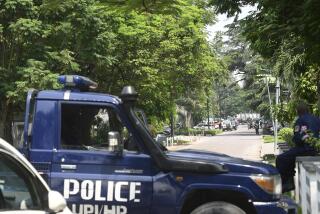Pentagon to Help Cities Combat Weapons of Mass Terror
As the anniversary of the Oklahoma City bombing nears, the Pentagon has begun a training program designed to help 120 cities deal with the potential terrorist use of chemical, biological or even nuclear weapons.
Local police, firefighters, medics and other emergency workers will learn to identify such deadly weapons, deal with victims and carry out any decontamination that might be required, officials said Wednesday at a Pentagon briefing.
Under this year’s $42.6-million program, the military will set up a multi-service “Chem-Bio Quick Response Force” of up to 500 people. Members of the force will travel around the country training local officials, and the Pentagon plans to set up a hotline and an Internet site with more help. Specialized training also will be done at some military installations.
The commander of the Army’s Chemical Biological Defense Command, Maj. Gen. George Friel, will be in charge of the training program. He is based at Aberdeen, Md.
By Oct. 1, 27 cities will be assessed for setting up the initial programs. Over the next three years, the officials said, they hope to reach the nation’s 120 largest cities, if those cities want to take part.
Denver offered to be the pilot city for the program, and a team arrived there Monday to assess its needs. By the time leaders of the world’s top industrialized democracies gather there for an economic summit in June, the initial training work will be well on its way, the officials said.
Besides Denver, the next eight cities to be studied are New York; Los Angeles; Chicago; Washington; Houston; Kansas City; San Diego, and Philadelphia.
Meanwhile, the military reported that the man-made cavern that houses the nerve center for U.S. and Canadian air defenses was under tightened security Wednesday because of an unspecified security threat.
Senior military officials later said they may have overestimated the credibility of the threat, but that the stiffened security would remain for the time being.
Air Force Maj. Gen. Jeff Grime, commander of the Cheyenne Mountain space-tracking complex in Colorado, said there was no threat to nearby Colorado Springs, Colo., or several other major military installations in the area.
In a later interview at nearby Peterson Air Force Base, Vice Adm. Lyle Bien said officials had determined that the credibility of the information was in doubt. He added that the extra security precautions would be kept just in case.
Bien said the information, while still not completely discounted, had come third-hand. It had indicated a “potential for some kind of attack” on Cheyenne Mountain, one of the most secure U.S. facilities, he said.
The air station is headquarters for the U.S.-Canadian North American Air Defense Command, or NORAD, which monitors airspace over the continent.
More to Read
Start your day right
Sign up for Essential California for news, features and recommendations from the L.A. Times and beyond in your inbox six days a week.
You may occasionally receive promotional content from the Los Angeles Times.






